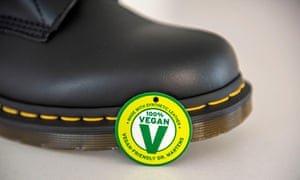
New guidelines have been set out by the retail business to ensure that vegan fashions are really 100% free of animal products.
The guidelines come at a time of soaring demand for vegan fashion from retailers ranging from specialist independent labels to Marks & Spencer, Topshop and New Look. However, the fashion industry is trailing behind supermarkets, where one in five of all new products launched last year were vegan.
The new guidelines for producing vegan fashion have been drawn up by the British Retail Consortium (BRC), the trade body for stores and online sellers, after it was inundated with requests from fashion buyers trying to source vegan products for the first time.
The process is more complex than just eliminating popular materials such as leather, suede and wool. Businesses must examine every material used in a product, including the ingredients of the glues, dyes and waxes used.
The BRC warns retailers they should should not claim a product is sustainable simply because it is vegan – a definition that means only the product contains no animal-derived materials or ingredients.
Vegan-labelled items should also be providing an alternative to something that is traditionally made with animal products.
Leah Riley Brown, a sustainability policy adviser at the BRC, said if retailers followed the guidelines to the letter, shoppers could be 100% confident that the products they bought were truly vegan.
The ethical retail market, which spans everything from food and drink to cosmetics, was worth more than £40bn by the end of 2018. That compares to about £11bn 20 years ago, according to an annual study by the Co-op.
While eating ethically – a banner that covers Fairtrade, organic, vegetarian and plant-based alternatives – has taken off, the clothing market has been a laggard. Ethical fashion spending is only £50m, which is a fraction of the £35bn fashion market (although sales of vintage and secondhand clothing have rocketed).
However, growing concern about the climate crisis and the role played by fast fashion means attitudes to consumption are changing fast, particularly among young people. Two-thirds of 16- to 24-year-olds said they were trying to make more ethical fashion choices than a year ago, according to a poll by the research firm Mintel. That compares with an average of 57% of all British shoppers.
The Mintel study found that more than a third of fashion shoppers would like to spend their money in stores that did not use animal products. This trend has not gone unnoticed by retailers battling for sales: half of Marks & Spencer’s shoes are now vegan and three of its top 10 bestselling bags this winter were also vegan.
Chana Baram, a retail analyst at Mintel, said: “It’s no longer enough for clothing to be priced well or to reference the latest trends. Many young people today are likely to be influenced by the ‘Attenborough’ or ‘Greta’ effects and are becoming far more aware of the negative effects of fast fashion.”
The Scottish tights brand Snag, which only launched 20 months ago, is on track to hit sales of £20m this year. Its founder, Brie Read, says its tights, which are vegan and come in rainbow colours, have struck a chord with women frustrated by ill-fitting, conservative hosiery.
Read says it was an active choice to ensure its products were vegan – some fashion is by accident rather than design. “For us, it was dyes,” she explained. “A lot of them are not vegan friendly because they are made out of crushed beetles. We have to be careful about the dyeing process and getting really good cotton.”
Snag’s business model involves interacting every day with potential shoppers on social media. “We’re very much based around our customers and lots of them are vegan and concerned about ethics,” Read said. “They ask us every single day: ‘Are your tights vegan?’”
Mintel found that shoppers were confused by conflicting messages regarding what is, and is not, sustainable, and that the fashion business needed to develop industry-wide best practice guidelines.
[“source=theguardian”]
